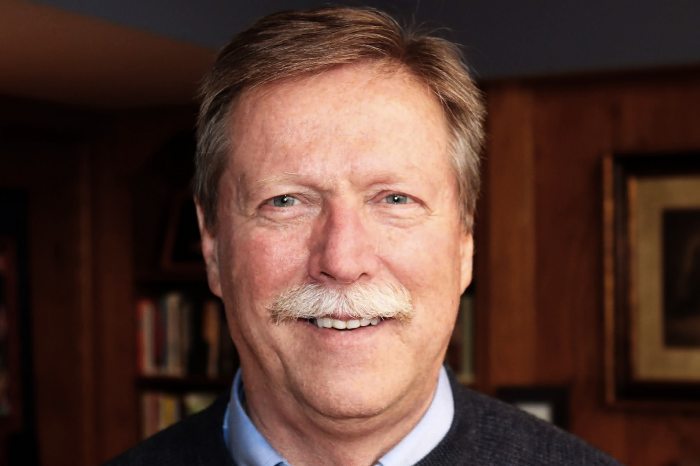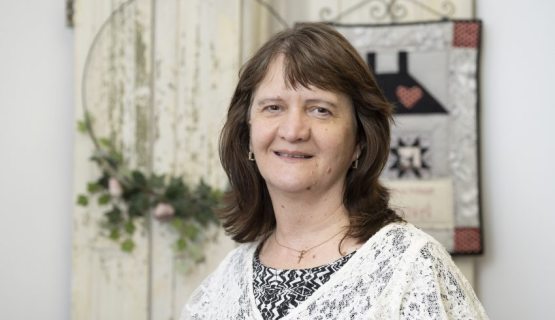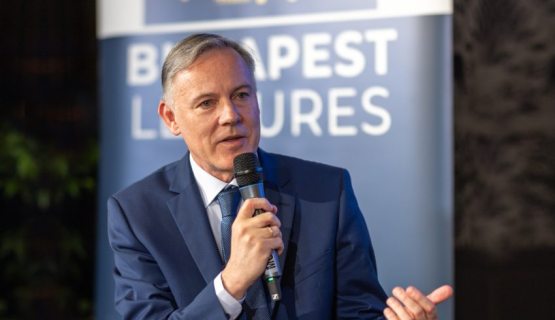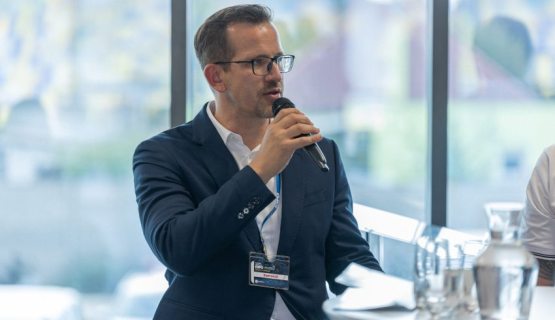"We exist from the moment God first thought of us" – Kurt Dillinger on protecting life
There is nothing more valuable than human life, says LIFE International, an American life-protecting organization founded in 2001 in Michigan. Its members in hundreds of countries around the world today are just as committed to helping pregnant women in difficult situations as God cared for all of us long before we were born. In an exclusive interview, Kurt Dillinger, the founding president of LIFE International, tells Kepmas.hu about their activities, their driving forces, and his personal creed.

When and why did the issue of protecting life become so important to you?
Before I found LIFE International, I was a pastor in a church. I read important parts of scripture over and over again, such as Genesis, where it says we are made in God's image. One time when I preached about it, the Lord began to speak to my spirit personally. Until then, all I thought about abortion was that it was wrong, I didn’t support it. But then God said, ‘Kurt, you do not know my heart on this issue’. Although I had supported life, then I realized that it wasn’t just about saving children or women’s rights, although these things were important to God and to me as well. But the Lord said, ‘abortion is an attack on me’. That broke me because as a pastor I should have understood him perfectly by then. As soon as I understood his message, everything has changed in me. I understood what God wanted from me, which led to the founding of Life International 20 years ago. At the time, not too much effort was made by humanity around the world to protect life, and I am still lacking it in many countries today.
Through my work, however, I seek to be the voice of Father’s heart in this matter.
How do you experience, how much the world’s attitude toward abortion has changed in the last two decades?
Not enough. The changes occur person by person. We try to bring together leaders in different countries, they are mainly pastors, sometimes politicians, lawyers, educators. We train them on how to pass on our life-protecting biblical view to people instead of other worldviews. Many times priests also say they have never talked about this in this form, so we already feel able to change people’s lives. We are already present in more than a hundred countries, but our goal is to reach and spread the message of the Lord in all countries. We would help people choose life, make pregnant women aware that God loves them and their children. The value of human life seems to be diminishing, so we want to say in the name of Jesus that all life is valuable. And our relationship with God is a real treasure, regardless of gender, origin, nationality, age.
Of course, not everyone is a Christian – or follows any other world religion – so it may not always be easy to convince people. What arguments do you usually use?
As I travel the world, I find that most people have never heard that God loves them. But as a follower of God, I care about them. Ephesians says we are to be imitators of God. I try to turn to people with the same dignity that Jesus turned to us. When I wait at an airport or sit down at a restaurant, I used to ask, for example, the waiter, ‘If someone prayed for you today, what would you ask them to pray for? Can I pray for you?’ Sometimes there are tears for this because no one has ever turned to him with such attention.
Listening to the other, listening to your story as you listen to mine now, asking questions means: appreciating each other’s lives.
Nor do you do it as a journalist, even though it is your profession, but you pay attention to other people by imitating God. As believers in Christ, we are invited to listen to anyone we meet. When we do that, people open up, they become interested. And then we can tell them that God loves them, so much so that He sent His only son to die on the cross for them. It depends on our attitude and our heart: whoever feels that we care about him becomes receptive to our message. This is how many people receive Jesus into their lives, even though they have never heard of him before.
If I’m not wrong, the most important message beyond God’s love is that life does not begin with birth, but begins long before it. Many still call the developing little person a fetus during this period…
Our pastor recently gave a lecture in Cambodia, a small village in the middle of the jungle where a lot of men were killed or expelled under the dictatorship of Pol Pot, so the majority are women. One hundred and twenty Buddhist women appeared at the lecture. The pastor told them for two hours about the miracle of life, the conception, and from there all the stages of development to birth. What happens in the womb, how the person develops. Because at LIFE International, we call him a person. When his heart starts beating, your brain, your circulatory and respiratory system, how your lungs develop. When he is ready to be born. It turned out that none of those women had heard of it before. The pastor then asked if they would like to meet God, who, as Psalm 139 says, was involved very intimately in forming you in your mother's womb. In fact, He thought of us before we developed in the womb. I believe we exist from the moment God first thought of us. And those ladies became open to the message of the gospel, along with the fact that if they believed in Jesus, they would have eternal life. On that day all the hundred and twenty received Jesus into their souls.
If you value the other person, the most beautiful treasure you can give him is to introduce him to Jesus, who gives meaning to his life. At LIFE International, we do that.
Can you imagine a situation where abortion is the only possible solution nonetheless? Can there be such a crisis for a mother?
This is no longer the case today. The only such situation could be when the mother’s life would be in danger if she kept the baby. But due to the development of medicine and technology, this is already an extremely rare case in developed countries, perhaps more so in developing countries, in the Third World, where they do not yet have access to all means and medicines. If the mother could die in pregnancy, she, her doctor and, if he is next to her, her husband will make a sensible decision together. The doctor has sworn to save lives, so in this situation, you obviously have to save the mother’s life, but basically, the goal is to save the baby and the mother’s life together if possible.
There are some extreme issues in abortion topic in the United States. In New York, for example, abortion is legal until birth, but Texas law completely prohibits it from the sixth week of pregnancy. How do you assess the situation overseas?
Some U.S. states have developed their own policies – some strictly prohibit abortion, others give it complete freedom, for whatever reason. There is a dynamic dialogue, but the current government would make abortion widely available. There are more conservative states and communities, such as Texas, Florida, or Idaho. There are also those where the local population is demanding stricter regulation. It is also interesting to note that there are also a number of pregnancy crisis centers in the states that support mothers in difficulty, but these are barely in the news because much of the media is too liberal, so there is no interest in presenting this type of care.
Yet these centers provide very well-organized, trained help, supporting hundreds of thousands of women each year in prenatal crises.
They also mediate mothers to local churches, even helping them get food and clothes. After all, they are often single, who are not cared for by their child’s father.
In such a divisive question, how can the success of your efforts be measured?
I mentioned the hundred countries, well, since the United Nations recognizes a total of 193 countries as sovereign, I am aware that we are only halfway to our goal. But even in that hundred, new challenges arise from time to time, as each country is different. In Hungary, for example, the protection of life in the womb has already been included in the Basic Law, but abortion is still possible. The situation is mixed, but we have the foundation on which to build protection of life, and that’s fantastic. Your country is in favor of life, you are on the right path, you are in the right direction. For many other countries, this can be an example to follow, so I can only encourage leaders and the Church not to give up, as they can even influence the surrounding countries by setting an example. This is because
young women in trouble should not be blamed or disregarded, but loved.
Not to promote everything that happened to them, but to lead them to the biblical path by standing by them. This is our job, regardless of whether the results can be measured in numbers. I am called to do this regardless of the outcomes. But fortunately, we are seeing good fruit. I hear stories like Cambodian from all over the world.
To what extent do you think this topic also concerns the male members of society?
I'm involved and I'm a man. And we are talking about it now as two men. If we look at it in general, men are not so involved in the subject, especially women care about other women in this sense. However, perhaps more and more men are recognizing their role, they are also seizing the opportunity to talk about it. But it also depends on where we go in the world because somewhere it is simply stated that it is the business of women. But pregnancy requires a woman and a man, so men are part of the problem. Another question is whether they are willing to be part of the solution. If you listen to the God, yes.
If you allow me a more personal question: are the other members of your family working in a similar field or are they similarly committed to protecting life?
I have been serving for 45 years and have been married for 42 years. With the same woman. And she’s more wonderful day by day for me, I love her more today than when we got married. God is constantly unfolding for me the beautiful gift that my wife means. We raised three children together, two boys and a girl who are already married, we also have six grandchildren. We talked a lot with the kids about what I do. My wife dedicated her life to the family while I sometimes traveled for 3-4 weeks, at which time she always showed the kids on the globe where I was going. I asked them as teenagers if they wanted me to continue what I started. I thought my son would say I'd rather finish it and be home. But he said God wants me to continue, so he supports me too. I was always concerned that they might not like God because God wanted me to do this but they would all gladly serve Him in their calling. Whether they work as a nurse or in the financial field. They are following the values they had received from me and are living their own lives with them, so I am a very lucky dad. Scripture says that if we lead our children in the way of the Lord, they will find their way back there. I am grateful to be able to experience this.







